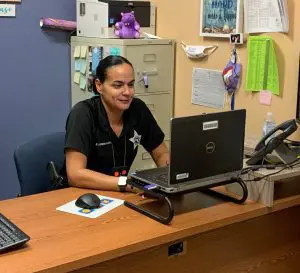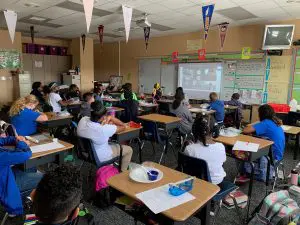The holidays are a popular time for new video game releases and new gaming consoles. However, you should be cautious when gifting games and consoles to teenagers and children. Regardless of what system is being used, video games and their chat rooms play a large role in internet crimes against children.
According to the New York Times, there were 18.4 million worldwide reports of child sexual abuse in 2018. Some reports included more than one image or video, totaling 45 million online images and videos flagged as child sexual abuse. While some popular social media messaging platforms were responsible for 12 million of the 18.4 million reports, video games and their chat rooms made up a large portion of the other 6.4 million incidents. Predators frequent video games and chat rooms because that’s where children are. According to the Pew Research Center, 97% of teenage boys and 83% of teenage girls play video games.
To help protect children against the increasing number of cybercrimes, the Office of Juvenile Justice and Delinquency Protection (OJJDP) created the Internet Crimes Against Children (ICAC) Task Force Program in 1998. ICAC is a national network of 61 coordinated task forces representing over 4500 federal, state, and local law enforcement, and prosecutorial agencies. ICAC helps state and local agencies develop effective, sustainable responses to online child victimization, including responses to the online sharing of child sexual abuse images.
The Central Florida ICAC Task Force is located here at the Osceola County Sheriff’s Office. From January 1st, 2020 to August 31st, 2020, the Central Florida ICAC Task Force received 4,365 cyber tips, investigated 2,123 cases, and served 600 search warrants resulting in 205 arrests. The ICAC Task Force spends a lot of time educating the public, including school-aged children, on how to be safe online. Read our prevention tips for children, teens, and parents below.

Detective Marrero teaching online safety tactics to 4th and 5th graders at Sunrise Elementary.
If you’re going to play video games and interact with others online, keep these safety tips in mind.
- Do not chat.
The best way to avoid cyber predators is to not chat with the other players. That means staying out of the chat room and staying off of your headset.
- Do not give out personal information.
If you do interact with other gamers, do not give out any personal information such as your real name, your family members’ or friends’ names, your address, your phone number, or your school.
- Never share any photos.
Do not share photos of any type with anyone online, no matter what they tell you. Some gamers may threaten you or your character if you do not send what they are asking for. Specifically, they may threaten to kick your character out of the room or the game. No matter what, do not send the photo or information. Let them kick you out, then report them.
- Reporting a user is always an option.
In every video game, chat room, and even social media, there is an option to report users. If another user makes you feel uncomfortable or asks you to send personal information or photos, report them as soon as possible. You should never feel bad for reporting someone, it is a safety precaution to protect you and other users.

Sunrise Elementary students listening to Detective Marrero’s Internet Safety Presentation.
Parents, please watch your kids.
As most parents know, those three words are easier said than done. However, many ICAC cases could be avoided if children were supervised more often while using technology. Below are examples of supervision to protect your children from online predators.
- Know all of your kids’ passwords.
You should have all of your kids’ passwords to gaming systems, video games, and social media in case of an emergency.
- Conduct random phone inspections.
Your children and teens may not like this one, but random phone inspections can help protect them against online crimes and predators. Take the time to explain what dangers they should look for online and why it’s important for you to check for them as well.
- Do not allow children to add apps without parental approval.
There is always an option to turn on parental controls. This will help you keep track of what apps your kids are using and allow you to research the safety of each one prior to allowing your children access.
- Little ones should never be on devices in a room alone.
Technology is being introduced at a younger and younger age every year. Many parents allow children to play on phones or tablets to keep them occupied. You should always be in the same room while younger kids are on a device. This allows you to keep an eye on any suspicious images, videos, or apps children may come across by clicking an unsafe link or entering a chat room.
- React carefully if your child reports an encounter with an online predator.
Come up with a plan to calmly put in place if your child comes to you with an incident. Punishing them by taking away their technology could backfire and push them to even darker more dangerous places for their online activity, which is exactly what predators want you to do. Instead, try to stay as calm and positive as possible so that your children cooperate and allow you to gather more information and evidence about the incident.
- Stay educated on the latest apps and video games.
Stay up to date on the latest technologies and online dangers lurking behind your screens and talk to your children about online safety. For more tips and information visit, www.icactaskforce.org.
If you or your children have an online safety incident to report, please call the Osceola County Sheriff’s Office at 407-348-2222.
View more Resources and related articles
NY Times – The Internet Is Overrun With Images of Child Sexual Abuse. What Went Wrong?

